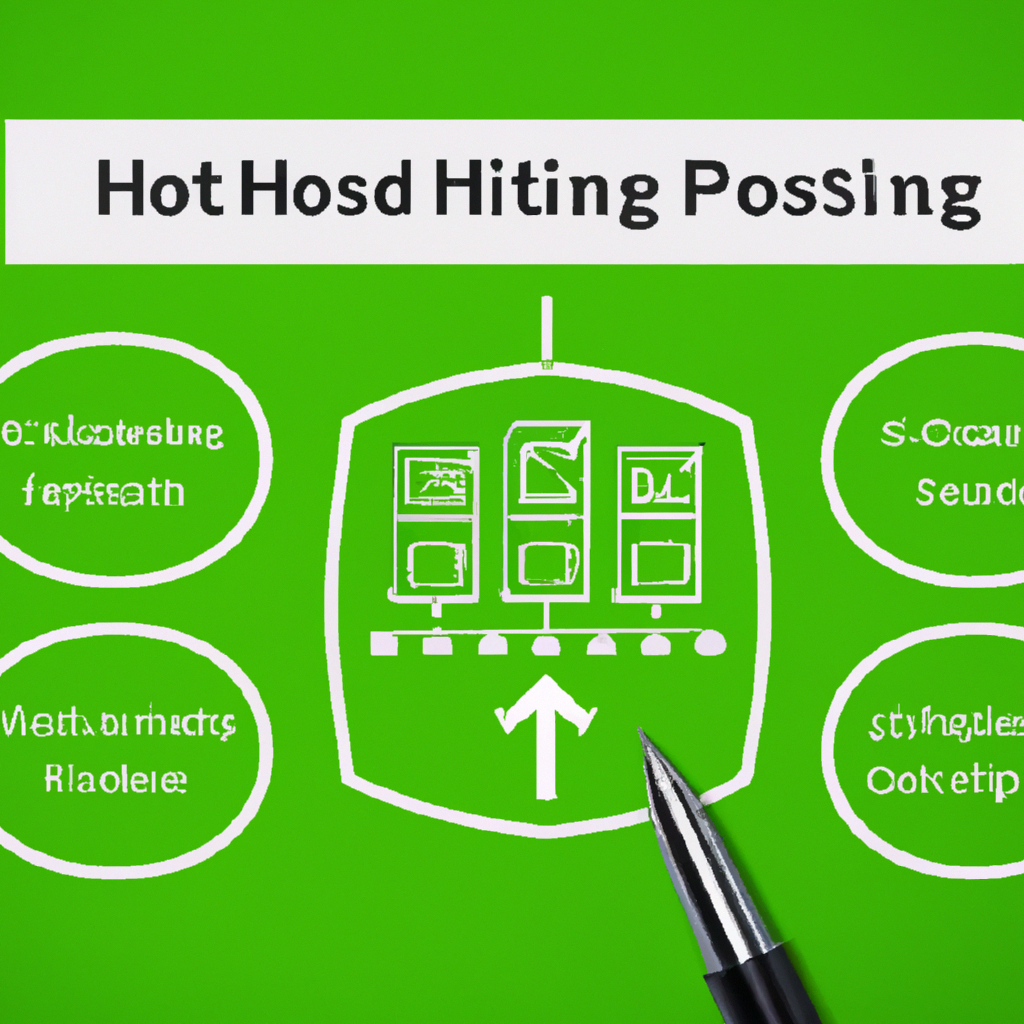So, you’re looking to get your website up and running and you’re faced with the daunting task of choosing a web hosting provider. With so many options out there, it can be overwhelming to determine which one is the right fit for you. But don’t worry, because in this article, we’ll break down the key factors you should consider when making your decision. By the end, you’ll have all the information you need to confidently choose the perfect web hosting provider for your needs. When it comes to finding the right web hosting provider for your needs, there are several factors that you should consider. The type of website you have, the hosting requirements, uptime and reliability, technical support, scalability, cost, control panel, security, server location, and technical specifications all play a crucial role in selecting the best provider for you. In this article, we will explore each of these factors in detail, helping you make an informed decision.
How to Make Money with YouTube
Create an empire of automated video websites for multiple streams of income
Type of Website
The first step in choosing a web hosting provider is determining the type of website you have or plan to create. Different websites have different hosting needs. If you are looking to create a personal website to showcase your portfolio or blog, a shared hosting plan may be sufficient. On the other hand, if you are running a small business and require more resources and control, a small business website hosting plan might be more suitable. For those looking to sell products online, an e-commerce website hosting plan with shopping cart functionality and secure payment processing is essential. Finally, if you are a frequent blogger, you would want a hosting provider that specializes in blog hosting, offering features such as easy content management systems and optimized performance.
Hosting Requirements
Once you have determined the type of website you have, it’s important to consider the specific hosting requirements. One of the primary considerations is disk space – the amount of storage available for your website’s files, images, and databases. Another crucial factor is bandwidth – the amount of data that can be transferred between the server and visitors’ browsers. Depending on the size and traffic of your website, you may need varying levels of disk space and bandwidth. Additionally, consider whether you require email accounts as part of the hosting package, as well as database support for dynamic content management systems or applications.

Uptime and Reliability
When choosing a web hosting provider, it’s crucial to consider the uptime and reliability they offer. Uptime refers to the amount of time your website will be accessible to visitors. A reputable hosting provider should offer a reliable server uptime guarantee, ideally 99.9% or higher. This ensures that your website will be available to users at all times, minimizing potential downtime that could impact your online presence.
In addition to uptime, it’s essential to examine the provider’s redundancy and backup measures. Redundancy refers to the hosting provider’s ability to handle potential server failures by having backup systems in place. This prevents your website from going offline in the event of hardware or network failures. Look for hosting providers that offer regular backups to ensure that your website’s data is protected and can be easily restored if needed.
User reviews can also provide valuable insights into a hosting provider’s reliability. Take the time to read reviews from other website owners to see their experiences with uptime, server performance, and customer support.
Technical Support
Technical support is an essential aspect of any web hosting service. You want to choose a provider that offers robust support options to address any questions or issues that may arise. Look for a hosting provider that offers 24/7 support, so you can reach out for assistance anytime, day or night.
Consider the communication channels available for support. Email, live chat, and phone support are common options, but some providers may offer additional channels such as ticket systems or online forums. This ensures you have multiple ways to get in touch with technical experts.
Response time is another crucial factor in technical support. A reliable hosting provider will respond to support inquiries promptly, ideally within minutes or hours. Avoid providers known for slow or unresponsive support.
Lastly, consider the expertise of the hosting provider’s support team. Look for providers that have knowledgeable staff who can assist with various technical issues, including server configurations, website migrations, and troubleshooting.

Scalability
As your website grows and attracts more visitors, your hosting needs may evolve. Therefore, it’s important to choose a hosting provider that can accommodate the future growth of your website. Look for providers that offer scalable hosting solutions, allowing you to easily upgrade your resources as needed. This could include increasing disk space, bandwidth, or adding additional features and functionalities.
Flexibility is also crucial when considering scalability. You want a hosting provider that offers various hosting plans so that you can choose the one that best suits your needs. This ensures you are not paying for unnecessary resources or locked into a plan that doesn’t offer the flexibility you require.
Cost
Cost is an important consideration when choosing a web hosting provider, but it shouldn’t be the sole decision-making factor. Consider the price range of different hosting providers and compare them based on the features and services included in each plan. Cheaper options may have limited resources or lack essential features, while more expensive plans may offer advanced functionalities and additional benefits.
It’s also essential to consider the payment terms offered by the hosting provider. Some providers offer monthly billing, while others require annual or multi-year commitments. Make sure to review the terms and cancellation policies to ensure they align with your budget and long-term plans.
Be cautious of hidden costs that may not be obvious upfront. Some providers may charge additional fees for services like website migration, domain registration, or SSL certificates. Look for providers that transparently list all costs associated with their hosting plans.
Ultimately, it’s important to choose a hosting provider that offers value for money. Evaluate the features, resources, and customer support provided by each provider to ensure you are getting a fair deal.
Control Panel
The control panel is the interface through which you manage your website and hosting settings. A user-friendly control panel can greatly simplify website management tasks, even for those without technical expertise. Look for hosting providers that offer intuitive control panel options, such as cPanel or Plesk, which provide a wide range of features and functionalities.
Consider the customization options available within the control panel. The ability to personalize settings and tailor your hosting environment to your specific needs is essential. Look for providers that allow you to customize your control panel or provide additional tools and plugins for enhanced functionality.
Security
Website security is of utmost importance to protect your data and users’ information. When choosing a web hosting provider, consider the security measures they offer. One significant aspect is the SSL certificate – a secure socket layer that encrypts data transmitted between the server and visitors’ browsers. SSL certificates are essential for securing online transactions and preventing unauthorized access to sensitive information.
Firewall protection is another critical security measure. A reliable hosting provider should have robust firewall systems in place to detect and block malicious traffic or hacking attempts.
Malware scanning is also important to ensure your website remains protected from potential threats. The hosting provider should offer regular scanning of your files and databases for any malicious code or malware infections.
Finally, consider the data backup options provided by the hosting provider. Regular and secure backups of your website’s data are essential to prevent data loss in the event of hardware failures or security breaches.
Server Location
The geographic location of the hosting server can impact your website’s performance. If your target audience is primarily located in a specific region, choosing a hosting provider with servers in that region can optimize latency – the response time it takes for a server to receive and process requests. A hosting provider with server locations closer to your visitors ensures faster loading times for your website.
Content delivery networks (CDNs) can also enhance the performance of your website by distributing static content across multiple servers worldwide. This reduces latency and ensures faster loading times for visitors regardless of their location.
Technical Specifications
Lastly, it’s important to consider the technical specifications of the hosting provider. This includes the operating system running on the server, the hardware specifications of the server, and the software support provided.
The operating system should be compatible with your website’s requirements. Common options include Linux-based systems like CentOS, Ubuntu, or Debian, as well as Windows-based systems.
The server hardware plays a significant role in the performance and reliability of your website. Look for hosting providers that use modern and powerful hardware to ensure optimal performance. This includes factors such as the number of CPU cores, the amount of RAM, and the type of storage drives used.
Additionally, consider the software support provided by the hosting provider. This includes the versions of server software, scripting languages, and database systems supported. Make sure the hosting provider can support the technologies and applications your website requires.
In conclusion, choosing a web hosting provider requires careful consideration of several factors. Assessing the type of website you have, understanding the hosting requirements, evaluating uptime and reliability, considering technical support options, planning for scalability, understanding the cost, assessing control panel features, prioritizing security, considering server location, and reviewing technical specifications can help you make an informed decision. By taking the time to research and compare hosting providers based on these factors, you can choose a provider that best aligns with your website’s needs and sets you up for success.







